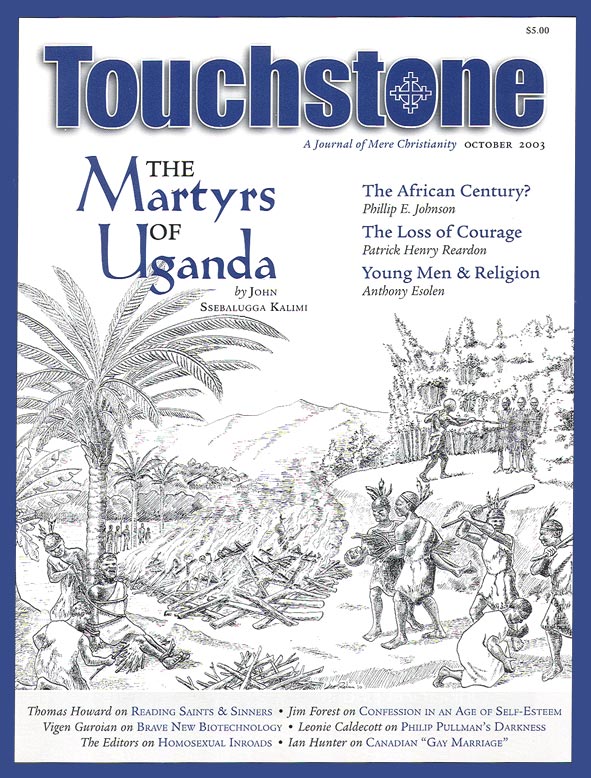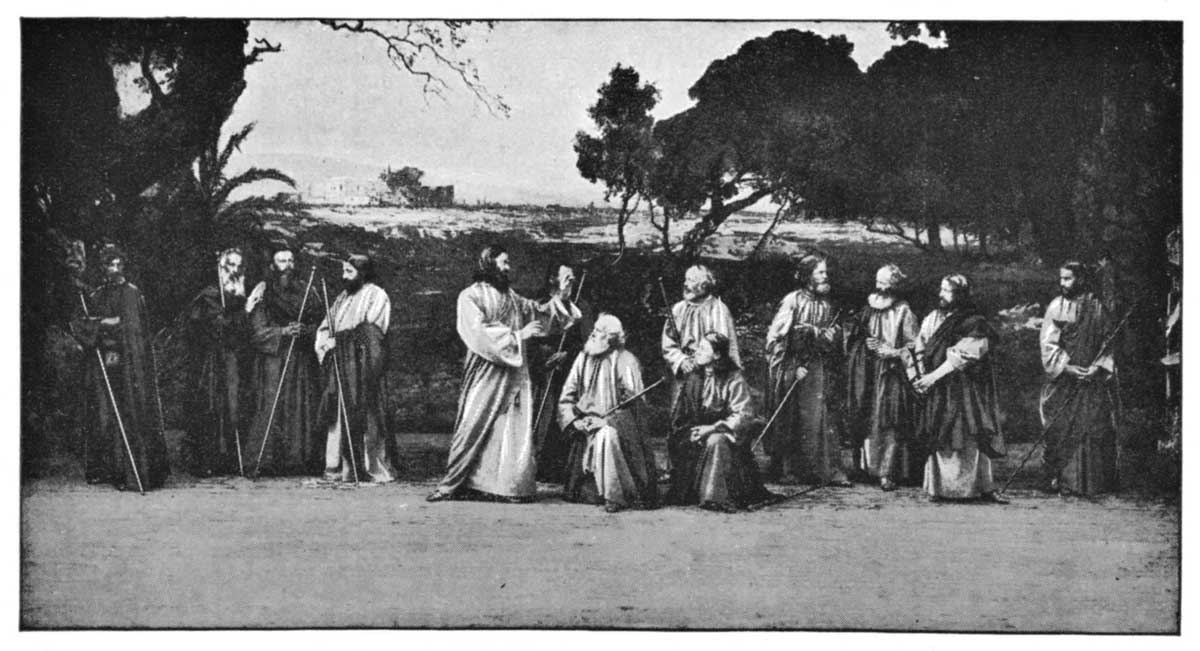Homosexual Inroads
This past June was a bad month for good sex. The Episcopalians got things going. On June 7, the New Hampshire diocese of that body, gathered in convention to choose a new bishop, elected the 56-year-old canon V. Gene Robinson, an avowed homosexual who has cohabited with another man for the past 13 years. The vote was no nail-biter. Robinson won the election by a margin of 96 to 69 among the laity, and a sturdy 58 to 19 among the clergy. Although Robinson is hardly the first active homosexual to be elected a bishop in the Episcopal Church, he is said to be the first Episcopalian who publicly admitted to the fact before being elected.
Moreover, Robinson did not just happen to be a homosexual, nor, it would seem, was he elected in spite of his homosexuality. On the contrary, there is reason to suppose that his homosexuality, or at least his homosexual activism, partly contributed to his popular appeal. Some of those who voted for Robinson drew attention to his formation of “Concord Outright,” a support group for homosexual and otherwise insecure teenagers (in the organization’s own words, “gay/lesbian/questioning”). Others mentioned a sense of “making history” by their vote.
For the past several decades, the Episcopal Church has shown itself increasingly tolerant toward the homosexual vice. Robinson’s episcopal election, however, was not an act of mere tolerance. It appears to have been, rather, the brazen and determined assertion of an ideological program. In placing an active homosexual in its highest available position of honor and executive authority, the Episcopal voters in New Hampshire had in mind to advance the militant homosexual agenda, to approve (in the sense that verb carries in Romans 1:32) of active homosexuality as a habit and way of life. This is certainly how the action of the New Hampshire diocesan convention was interpreted throughout the Anglican Communion, both by those who lamented the election and those who applauded it.
Most Americans, on the other hand, could hardly have cared less. This was just the Episcopal Church, after all, a religious group whose liberal activism, liturgical adventures, and other shenanigans have already cost it roughly one-half of its membership during the past twenty years. Among Americans outside of the Episcopal Church, it is safe to say, there was little concern about what happened in New Hampshire this past June.
But then came the Canadians. On’Œune 10, three days after Robinson’s election, the Ontario Court of Appeal handed down a sixty-page decision that changed the definition of marriage in that province from “the voluntary union for life of one man and one woman” to “the voluntary union for life of two persons to the exclusion of all others.”
This legal determination, jointly formulated by the court’s three judges, climaxed a long series of legal and political developments in Canada, which began in August 1981, when the Toronto city council called on the Ontario government to amend its Civil Rights Code to include “sexual orientation” (not activity, mind you, only orientation) among the prohibited grounds of discrimination. From then on, step by step for two decades, various Canadian courts and other governmental agencies, but especially in the Province of Ontario, relentlessly advanced a complete pro-homosexual agenda into law and public opinion. Consequently, this past June’s decision was in some respects no more surprising than the episcopal election in New Hampshire.
Indeed, a good number of folks were obviously prepared for what the Canadian court did. Over the ensuing week, but starting on the very day of the court’s decision, 89 marriage licenses were issued to homosexual couples by the Toronto city council, 49 to male and 40 to female couples. During that same seven days, at least one such “wedding” was performed. There seems to have been a concerted rush to act on the court’s decision right away, as though to preclude its being reversed by Canada’s Supreme Court. One lesbian activist told the Toronto Star, “If scores of us get married, how do they put the horse back in the barn?” (An unconvincing metaphor, if we may say so. In our own limited experience, it is generally rather easy to put a horse back in a barn.)
There was no need for those anxious couples to worry, as it turned out, because Canada’s government had no intention of appealing to the Canadian Supreme Court. On June 17, exactly seven days after the Court of Appeal’s decision, when opinion polls revealed that a slight majority of Canadians agreed with it, Prime Minister Jean Chrétien announced that pertinent legislation would be introduced to permit homosexual marriages throughout the country. His Liberal party saw nothing to be gained by resisting what had become a popular and growing movement.
We should note, furthermore, that Canada’s new policy on same-sex marriages went significantly further than that of Belgium and Holland, two other countries in which the arrangement is legal. Specifically, these latter countries limit same-sex marriage to citizens and residents, whereas there is no such restriction in Canada. This fact, though not explicitly addressed by the court, was made clear immediately, when the website of the Toronto city council, listing its requirements for marriage licenses, noted that “There are no residency or citizenship requirements.”
The significance of this clause was not lost on Americans living south of the border, and, risking the SARS infection that menaced Ontario at the time, homosexual couples started heading north to tie the knot (if this is the expression we want). Even by June 17, the day of Chretien’s announcement, the Windsor city council had already issued marriage licenses to three such couples from the United States.
Neither the Episcopalians nor the Canadians, however, quite prepared us for what happened on June 26, when the United States Supreme Court, by a vote of six to three, struck down a Texas law that prohibited sexual actions between members of the same sex. Even the most inveterate of optimists, those bold souls prepared to dismiss the Episcopalians as a fringe church and Canada as a fringe country, were hardly prepared for the likes of this. The judicial determination of June 26, Lawrence and Garner v. Texas, which reversed another Supreme Court decision of 17 years earlier, had the practical effect of overturning similar laws in 12 other states.
This Supreme Court decision, it appears to us, potentially affects the very structure of our society, because of the premises ratified and the reasoning pursued by the High Court in reaching its conclusion. According to Justice Anthony Kennedy, who wrote for the majority, the two men who petitioned against the State of Texas were “entitled to respect for their private lives.” Kennedy went on to comment, “The state cannot demean their existence or control their destiny by making their private sexual conduct a crime.” This argument, based on a relentless, overriding solicitude for—not to say entitlement of—respect and privacy is very ominous, we believe, for the future of marriage, which is the chief contractual bond on which human social life is structured.
First, with regard to “privacy,” there appears to be no logical reason why the Supreme Court’s argument must, or will be, limited to homosexual activity. It seems to us that such a complete and unrelenting right to privacy is equally applicable to other forms of sexual expression, including adultery. For this reason, Touchstone takes issue with the several public commentators who claim that the Court’s ruling will have no effect on laws governing marriage. If homosexual sodomy is protected from legal interference by reason of a sodomite’s right to privacy, why would not an identical right to privacy similarly protect the heterosexual adulterer? Legal prohibitions against adultery, however, exist solely and manifestly for the protection of marriage. In short, we contend that Lawrence and Garner v. Texas constitutes an oblique but no less real assault on the institution of marriage, which is the foundation of the family and, as such, of many other social relationships.
Second, with regard to the “respect” that our Supreme Court seeks to guarantee to homosexuals by its recent decision, we cannot but remark on its distressing similarity to the argument used by Ontario’s Court of Appeal some two weeks earlier, when it ruled in favor of same-sex marriages. In reaching that conclusion, the Canadian court declared that “the dignity of persons in same-sex relationships is violated by the exclusion of same-sex couples from the institution of marriage.” For our part, we perceive no significant difference between the “respect” sought by the Court in Washington and the “dignity” demanded by the court in Toronto. To us it appears that the force of the argument employed to keep sodomites out of jail can just as easily oblige society to issue them marriage licenses.
We are not alone in suspecting this to be a logical conclusion. At the very end of June there appeared the July 7 edition of Newsweek, the cover of which asked, “Is Gay Marriage Next?” This question, set over a picture of two young women cuddling, referred to the magazine’s major story, “The War Over Gay Marriage.”
Nonetheless, in spite of all the evidence indicating a positive response to that question, Newsweek suggested that the more likely answer is “no.” The authors commented that “the stronger movement, at least for now, appears to be in the other direction. Some 37 states—and the federal government—have adopted ‘Defense of Marriage Acts,’ which define marriage as applying only to a man and a woman, and—significantly—bar recognition of same-sex marriage from other states.”
It is our hope, of course, that this will continue to be the case, and we offer two considerations, under God, that bolster this hope.
The first may be described as the democratic factor. That is to say, most American citizens strongly disapprove of this kind of thing. Indeed, the physical images associated with homosexual behavior (such as . . . well, never mind) make many voters feel positively ill—what Newsweek called “the ick factor.” This democratic response to the thing readily explains why very little of the pro-homosexual agenda has been able to get through legislative processes, which are more closely controlled by the voters. Almost all of the advances recorded by the pro-homosexual movement have been achieved through the courts, which lie less within that democratic control. The pro-homosexual proponents seem to know that their only real chance lies in the courts.
The second consideration we will call the biological principle. Believing the homosexual impulse, whatever its origin, to be not only psychologically aberrant but dangerously at odds with the structure of human physiognomy, we are convinced that its expression faces a force radically unfavorable to its future. That kind of behavior just ain’t normal, and the empirical experience of our race suggests that the odds do not favor the pursuit of abnormality.
Meanwhile, however, the struggle continues.
—Patrick Henry Reardon, for the editors
Patrick Henry Reardon is pastor emeritus of All Saints Antiochian Orthodox Church in Chicago, Illinois, and the author of numerous books, including, most recently, Out of Step with God: Orthodox Christian Reflections on the Book of Numbers (Ancient Faith Publishing, 2019).
subscription options
Order
Print/Online Subscription

Get six issues (one year) of Touchstone PLUS full online access including pdf downloads for only $39.95. That's only $3.34 per month!
Order
Online Only
Subscription

Get a one-year full-access subscription to the Touchstone online archives for only $19.95. That's only $1.66 per month!
bulk subscriptions
Order Touchstone subscriptions in bulk and save $10 per sub! Each subscription includes 6 issues of Touchstone plus full online access to touchstonemag.com—including archives, videos, and pdf downloads of recent issues for only $29.95 each! Great for churches or study groups.
Transactions will be processed on a secure server.
more on sex from the online archives
more from the online archives

27.6—Nov/Dec 2014
Tales of Forbidden Stereotypes
Real-Life Men & Women & the Tragic Loss of Human Comedy by Anthony Esolen

28.2—March/April 2015
Man, Woman & the Mystery of Christ
An Evangelical Protestant Perspective by Russell D. Moore
calling all readers
Please Donate
"There are magazines worth reading but few worth saving . . . Touchstone is just such a magazine."
—Alice von Hildebrand
"Here we do not concede one square millimeter of territory to falsehood, folly, contemporary sentimentality, or fashion. We speak the truth, and let God be our judge. . . . Touchstone is the one committedly Christian conservative journal."
—Anthony Esolen, Touchstone senior editor










